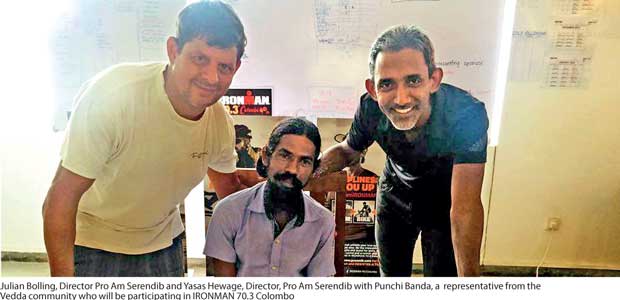Reply To:
Name - Reply Comment
Last Updated : 2024-04-26 19:49:00
 Julian Bolling, Head Coach and Director, Rainbow Swimming Academy needs little introduction as in the years gone by he put Sri Lanka on the map when representing the country in swimming. Bolling is also the Director, Pro Am Serendib, the company behind IRONMAN 70.3 Colombo, which will hit the streets of the city by the sea on Sunday (25).
Julian Bolling, Head Coach and Director, Rainbow Swimming Academy needs little introduction as in the years gone by he put Sri Lanka on the map when representing the country in swimming. Bolling is also the Director, Pro Am Serendib, the company behind IRONMAN 70.3 Colombo, which will hit the streets of the city by the sea on Sunday (25).
QHave you done a triathlon?
Yes. One in Hawaii where athletes came from the mainland (US) and I recall it being a qualifying triathlon for the IRONMAN. It wasn’t a branded event at the time and it was in the late 80’s/early 90’s when I was quite fit in the water. It involved a one or two mile swim so I came out of the water first with my friend, got on the cycle, started to ride feeling the wind, feeling good, the speedometer said ‘something’ miles per hour and I thought, that’s kind of cool, and then suddenly like the wind the bike started passing me and just like that it was the end of my little saga but I managed to complete the race.
DIG Sahabandu of the Special Task Force, who died in the war, a friend of ours, organised the first triathlon in Sri Lanka back in the 80’s when I was abroad. I took part in the second one he organised at Modara and it involved a 200 metre swim in the shallow end because people couldn’t swim and we cycled and ran through Colombo.
The question is whether you are going to be fit and what IRONMAN has taught me is that I don’t think the past matters – they say Julian Bolling is in the team, yes he is but to me Yasas (Hewage) and Rajan (Thananayagam) are the real story because it is not about who we were in the past but about who we are today and in my case what is beyond national swimming is life!
 QWas it the full IRONMAN that you did in Hawaii?
QWas it the full IRONMAN that you did in Hawaii?
Well, it included a 50 mile bike ride and a 10 mile run and the people from the mainland said they were there to qualify for the IRONMAN and there were about 500 bikes parked when I finished my cycle ride! I recall going up a hill and running out of energy. I was on the easiest gear but my feet were locked onto the pedals which you have to hold on to, to stay stationary then hold on to the pillar and unclip so I couldn’t stop half way up the hill and I was about to fall and this Marine started yelling at me encouraging me – and when I got to the top of the hill I saw the end!
QWhy didn’t you participate in a triathlon again?
They didn’t have any which is very sad. I think we should remember DIG Sahabandu who died in a landmine as he pioneered this through the YMCA because once he died it discontinued.
We want to host a few local triathlons and duathalons which are obviously fitness based. We’d like to get more people on the road, for the non-walkers to walk and for the walkers to start running so let’s see how it evolves
 QWhat happens once you finish competitive swimming?
QWhat happens once you finish competitive swimming?
Either you put on weight or you go into coaching and still put on weight!
The question is whether you are going to be fit and what IRONMAN has taught me is that I don’t think the past matters – they say Julian Bolling is in the team, yes he is but to me Yasas (Hewage) and Rajan (Thananayagam) are the real story because it is not about who we were in the past but about who we are today and in my case what is beyond national swimming is life!
One thing is, I hate to swim. I try to swim because we have a masters swimming programme at our club but once I coach for two hours in the morning and once I see the masters’ guys coming I don’t want to get into the same pool that I was staring at for two hours, plus I’ve done this sport.
I play badminton as a recreational sport and I personally feel that sports like swimming, cycling and running are monotony at the highest level.
Yasas’ story is interesting, he loved cycling but he didn’t compete but we competed. Can I compete in another sport? So maybe IRONMAN gives me the right balance if I go into a triathlon with fitness in mind, but I think the more I hear about the story of the IRONMAN athletes, it has opened my mind to what sport is, even for a competitive athlete.
This whole winning business versus being the best you can be – I have taken a leaf well, more than a leaf, a whole tree out of the All Blacks, a team that is the most successful team in the world that says winning is not important and with IRONMAN too, winning isn’t important. So here are two extremes of an 80 year old citizen, from Hong Kong who is competing and the All Blacks, the best team in the world, the most successful in any sport, having the same philosophy in sport, which is to be the best you can be, take on a challenge, do something new and you will smile at the end of it. Of course a lot of training goes into it like Rajan’s story about being an accountant and putting in 20 hours of training a week – he forgets his television, I love my television, so everybody has to make a choice.
I surf, and if you talk about sports tourism I think surfing might be the biggest in Sri Lanka. I don’t want to take anything from IRONMAN but if you see the hundreds of tourists that come here as backpackers, most of them come to surf.
I also kite surf during the off season but surfing is what I enjoy and I swim to stay in shape so I can at least survive the waves.
QWhat are the challenges of swimming in the pool versus the ocean?
There is this surfer guy who plays music Jack Johnson and I was listening to one of his songs which described how the ocean is all wonderful but that it brings you jellyfish, rip currents and dangers from the elements but if you can overcome them, the rest is cool – that’s on the surfing side.
The open water is as spectacular and it’s an Olympic sport (10km swim). In the open water you have to face the elements but in the pool what’s your element? Nothing, so it’s safe. That is why a lot of open water swimmers or triathletes do most of their training in a pool using the clock.
Dr. Jan Prins had a workshop for triathletes in Colombo and he simply said if you swim without a clock you don’t get what you want. He also talked about interval training on a certain time base which helps you to be fitter when you use the clock. In the open water you don’t have that clock factor. The ocean is also seasonal – there’s six months of good weather here (in the West Coast) and six months in the East coast, while our fresh waters are not too safe – the fear of crocodiles exist in Diyawanna, Bolgoda or any river today so I wouldn’t recommend it, while the Beira Lake – we all know why we shouldn’t swim there! We have some beautiful waters which can’t be used so the pool is where most open water athletes can train.
QWould you encourage a triathlete to train in the sea before a triathlon?
I think they should, that’s common sense but the question is how much access do you have to the sea? If the ocean is in your backyard and there is no pool around or the pool is 30 minutes away but you have a busy lifestyle – then you might use the ocean so it’s all about those variables but you need to have your open water experience as a professional triathlete. In that cycle of training on a weekly basis I am sure they have an open water swim – I did open water swimming when I achieved my best times in 1986 Asian Games because the pool at the University of Hawaii was closed for over a week because of a water polo tournament which included 80 odd teams and was apparently the biggest tournament in the world. So here I was, a month away from my biggest meet, fully focussed or trying to be focussed, and suddenly the pool is closed so I had to go in the ocean at Ala Moana Beach and swim and I was challenged.
QWhy did you get involved with IRONMAN 70.3 Colombo?
Somebody asked me, ‘What do you want to do in life, what are your dreams?’ and I said, ‘Look I would like to dream together so I don’t have to dream alone’ – that means if a few of us get together to do something to make a difference then I’d like to be part of that team and that’s the kind of place I am involved in, in my day to day life, working with other people as a team. Sometimes you lead the team, sometimes you are still part of the team but in the case of the IRONMAN, it’s a nice marriage between Yasas, Rajan and I. In a funny way, we complement each other and obviously we want this for the country. I also think there’s a feel good factor that when it happens on February 25, 2018 we are going to feel like great because this is a good thing. When you talk to all the different stakeholders, the different ministries, from security to tourism and sport and the roads, everybody is so helpful because they feel this country needs events like this and I am glad that I am a part of it but the event can, not just bring in tourists to Sri Lanka but also get people going with their fitness.
As a Pro-Am company that we have registered now, we are looking at running triathlons throughout the year to encourage more locals because if you look at the numbers that are competing as Sri Lankans most of them are relay teams – a lot of triathletes don’t have swimming as their primary discipline so being a swimmer is a major benefit even though the distance or the time spent in the event is way less than the other two disciplines, so I think what we would do is use the pools and have short distance swims and then add cycling and swimming and you would see more (athletes) coming in.
QDo you see a future for IRONMAN/IRONMAN 70.3 Colombo?
We want to host a few local triathlons and duathalons which are obviously fitness based. We’d like to get more people on the road, for the non-walkers to walk and for the walkers to start running so let’s see how it evolves.
QIs swimming a factor towards people registering?
The ocean is a different element, your times might be a little slower but you float better because of the buoyancy factor but it’s serious because of the current and there will always be a current, strong or mild in the ocean, but if it helps you one way, then you have to swim against it –that’s the fun part.
You also see people taking up challenges – in the first sea swim practice, we completed 400m – 800m and then the full 1.9km which is huge and there was a guy who I accompanied in the first race. He was one of the slowest, so I stayed with him on my surf board and we went up to the 400m mark and he hung onto my board for a short while and chatted. He said the last time he got into the water (this guy is in his 40’s) was when he was six years old and that was a drowning incident. So you don’t need the IRONMAN because that in itself was a personal achievement, and you can’t add a value to that feeling that he has and what he has accomplished. The tsunami brought a fear factor to children in Sri Lanka so we did a programme called, Swim Lanka, where we gave the beach back to the kids affected (by the tsunami), if not they would have had lifelong scars and this gentleman I’m sure overcame a major issue in his life and got over that fear factor.
It’s the selfless spirit in case of the relay teams and the idea that nothing is impossible, that makes the IRONMAN experience truly unique
QSo Sri Lanka is going places with IRONMAN?
I’ve been told that most of the time when they host a race for the first time they don’t sell out so I think the team here has worked extremely hard and this is not about Yasas, Rajan and I, this is about the rest of the team including those volunteering and it’s also you guys in the media, everyone has played a role, and that’s the most beautiful thing, that the highlight is not about us but about everybody from the guy who cleans the streets so let’s acknowledge them too as the most important people.
QWhat are the risks involved in doing an IRONMAN?
We had a drowning of a diver friend in Batticaloa, and there was a talk show on a private radio station with one discussion being why do people take risks? I have taken a risk in diving and had a point of no return. Why? Because I wanted to go deeper. Why? Because I get a high out of it and then I break all the rules and then I run the risk. During the show we had a caller who said if you see an empty bus travelling and you see a young guy hanging on the footboard and leaning out when there are seats inside why is that? Because that person gets his high out of it, which is a similar in those participating in IRONMAN but I will have to wait to see the finisher running under the arch and hitting the red carpet and you are going to see some faces and expressions that you haven’t seen before. So fitness is one thing but this type of thing is to challenge yourself.
We asked IRONMAN and they said there are fatalities every year but a lot of people say they’d rather die doing one of these so it’s a personal challenge – It’s a thing between the heart and the mind and what rules.
We are going to have divers with tanks ready to go under and pick (bodies). If you are drowning you don’t need a diver because you pluck them out but if somebody goes down he/she is dead. However every possible precaution has been taken including four resting pontoons along the course and surf rescue boards with lifeguards.

QWhat makes IRONMAN unique?
Denis Crassier’s story is incredible. Denis trains the visually impaired athletes and Punchi Banda and he got a heart attack playing third tier French rugby. He was a top end scrum half and he had two stents and he’s doing all this so it’s encouraging because some people run into a problem and say, that’s it, so that’s why these stories are important.
In terms of the relay factor what I see is that one person trains because that person doesn’t want to let the other two people down which is a beautiful story right there. There is a team element like in rugby where you put your body in the line for the sake of another player.
A girl withdrew because she wasn’t sure if she could compete because she probably thought of the others but if it was only her she could do it and not finish it, and that’s fine but when you are in a relay situation, you are looking at two others.
There is a story about an IRONMAN athlete who lost his legs in the war, an American. He attempted it and couldn’t finish but he went to the finishing line and encouraged his friends when they were finishing, now, that’s a story.
It’s the selfless spirit in case of the relay teams and the idea that nothing is impossible, that makes the IRONMAN experience truly unique.
Pix by Kanishke
Ganewatte and courtesy
Pro Am Serendib

Add comment
Comments will be edited (grammar, spelling and slang) and authorized at the discretion of Daily Mirror online. The website also has the right not to publish selected comments.
Reply To:
Name - Reply Comment
US authorities are currently reviewing the manifest of every cargo aboard MV
On March 26, a couple arriving from Thailand was arrested with 88 live animal
According to villagers from Naula-Moragolla out of 105 families 80 can afford
Is the situation in Sri Lanka so grim that locals harbour hope that they coul